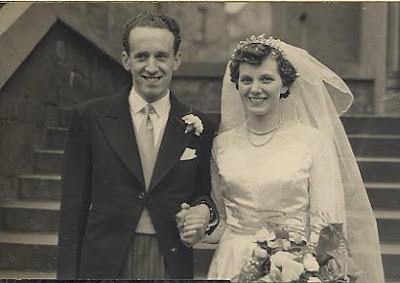-o-o-o-o-o-o-o-o-o-o-o-o-o-o-o-o-o-o-o-o-o-o-o-o-o-o-o-o-o-o-o-
FROM MY ALBUM

Jean and I with our daughters Fiona, Lesley and Margaret
-o-o-o-o-o-o-o-o-o-o-o-o-o-o-o-o-o-o-o-o-o-o-o-o-o-o-o-o-o-o-o-
ANOTHER ANNIVERSARY
Sixty-six years ago today was my last day at secondary school.
Most of my class had been together for five years and now we were all going our separate ways. Quite a few of us would never meet again.
It’s said that, when looking back, one remembers mainly the good times, but I do believe I really enjoyed Lenzie Academy.
Our class were very fortunate in having excellent teachers. There was one exception - the science master who seemed to us to be really ancient, and I don't think I learned much in his class.
My favourite subjects were Latin, French and English. I disliked Science, Technical Drawing and Woodwork (these subjects I dropped after Third Year) and I positively hated “Gym.” I’ve got to admit that I didn’t care much for Music, and this is strange considering that music became so important to me in later years.
It may surprise you to know that I still have the test papers for the final exams which I sat in March 1943, and also my Certificate showing that I got 3 Highers - Latin, French and English, and 2 Lowers - Maths and History. I also passed the separate Arithmetic paper.
And now, the big confession - I was having a look at those exam papers the other day, and there wasn’t a single question that I could attempt to answer! The Maths paper in particular was completely meaningless!
-o-o-o-o-o-o-o-o-o-o-o-o-o-o-o-o-o-o-o-o-o-o-o-o-o-o-o-o-o-o-o-
WHAT HAS BECOME KNOWN as the Hudson River School was a group of American artists who, inspired by British painters like Constable and Turner, were involved in a romantic art movement in the 19th century. Founded by Thomas Cole, the group numbered around twenty and included painters like Thomas Moran, Albert Bierstadt and Frederic Edwin Church.
This slide show contains 20 paintings, typical of the Hudson River School.
-o-o-o-o-o-o-o-o-o-o-o-o-o-o-o-o-o-o-o-o-o-o-o-o-o-o-o-o-o-o-o-
THIS IS FOR LESLEY - our daughter who loves horses.
From time to time people tell me, “Lighten up, it’s just a horse.”
Just-a-horse brings in to my life the very essence of friendship, trust and unbridled joy.
Just-a-horse brings out the compassion and patience that makes me a better person.
Just-a-horse brings out what’s good in me and diverts my thoughts away from myself.
So for me and folks like me, it’s not just-a-horse but fondest memories of the past, the pure joy of the moment, and all the hopes and dreams of the future.
I hope that someday they can understand that it’s not just-a-horse, but the thing that gives me humanity and keeps me from being…… just-a-woman.

-o-o-o-o-o-o-o-o-o-o-o-o-o-o-o-o-o-o-o-o-o-o-o-o-o-o-o-o-o-o-o-
A thought -
So many gods, so many creeds,
So many paths that wind and wind,
While just the art of being kind
Is all this sad world needs. (Ella Wheeler Wilcox)
-o-o-o-o-o-o-o-o-o-o-o-o-o-o-o-o-o-o-o-o-o-o-o-o-o-o-o-o-o-o-o-
Remember last week’s conundrum?
The first person makes me and sells me.
The second person buys me but doesn’t use me.
The third person uses me but doesn’t see me.
What am I? The answer is - a coffin!
-o-o-o-o-o-o-o-o-o-o-o-o-o-o-o-o-o-o-o-o-o-o-o-o-o-o-o-o-o-o-o-
This final clip will bring back memories - “Silence is Golden” was No 1 in the UK Charts in May 1967. Performed of course by The Tremeloes, this group formed in 1958 is still to the fore more than 50 years later!!!
-o-o-o-o-o-o-o-o-o-o-o-o-o-o-o-o-o-o-o-o-o-o-o-o-o-o-o-o-o-o-o-
"Go placidly amid the noise and the haste,
And remember what peace there may be in silence."
Those are the first lines of Max Ehrmann’s prose poem “Desiderata.”
In my blog John’s Quiet Corner posted today I have included a visual presentation of the complete poem against a background of lovely scenery, and accompanied by the sublime music of Samuel Barber’s Adagio for Strings.
The whole video takes 10 minutes, but I highly recommend it.
the address is - http://john-quietcorner.blogspot.com/
-o-o-o-o-o-o-o-o-o-o-o-o-o-o-o-o-o-o-o-o-o-o-o-o-o-o-o-o-o-o-o-

















